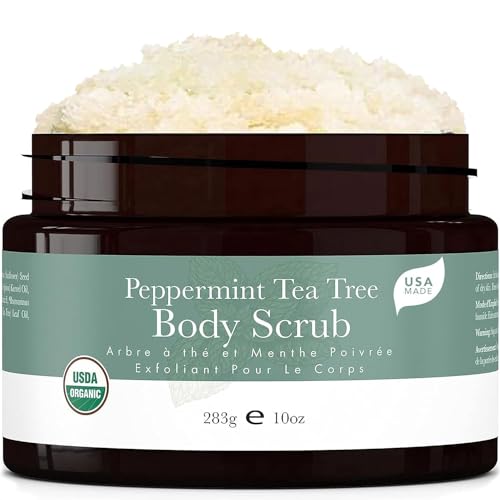
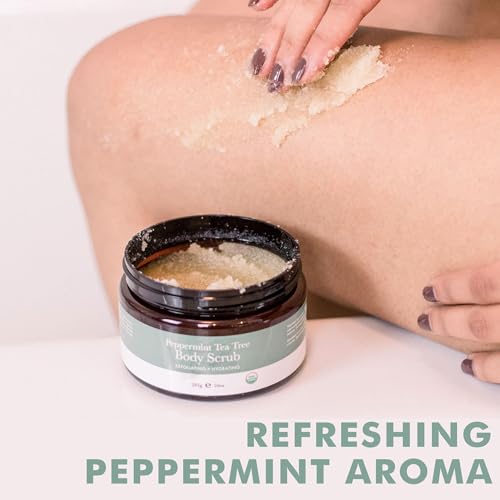
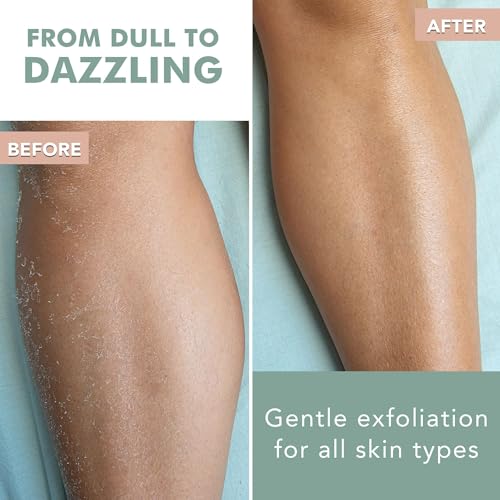
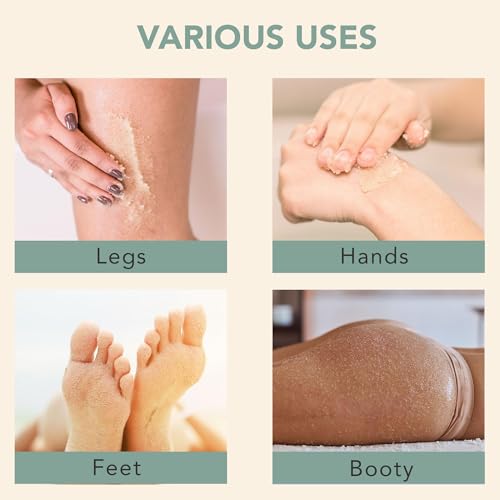
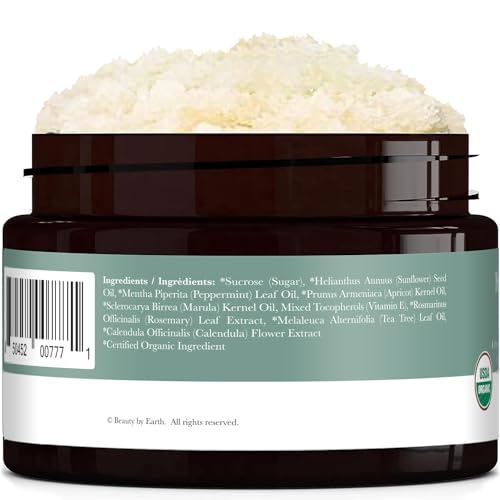
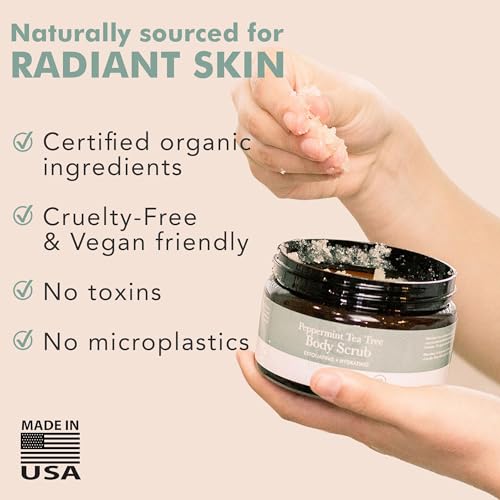
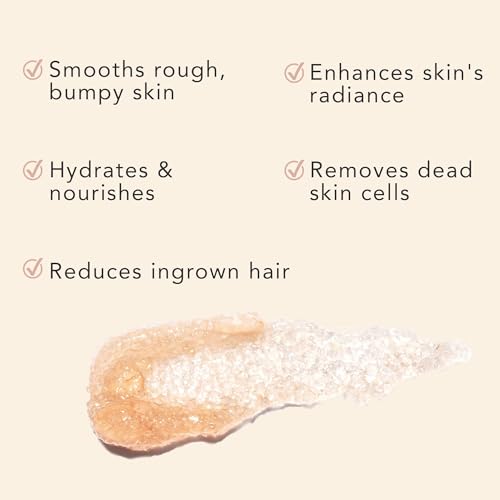
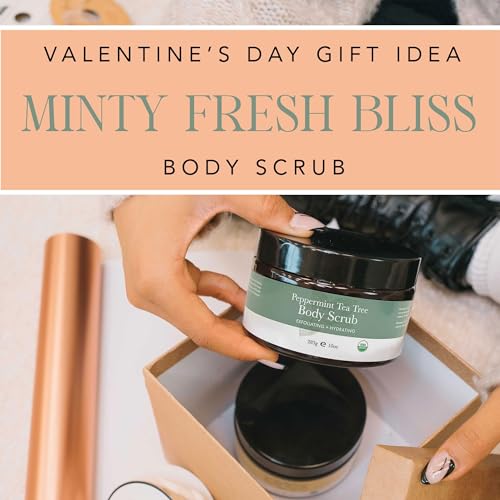
Peppermint Tea Tree Body Scrub - Moisturizing Exfoliator for Dry Skin, Organic Ingredients - 12oz


Mentha Piperita (Peppermint) Oil
High RiskMentha piperita (peppermint) oil is a volatile oil extracted from the leaves of the peppermint plant, known for its strong aroma and flavor. It is commonly used in cosmetics and personal care products for its cooling properties and fragrance enhancement.
Sustai Insights
Peppermint oil offers functional benefits such as antimicrobial properties and a soothing sensation on the skin. However, it is associated with a high potential for allergies and skin irritation. Regulatory bodies impose certain restrictions on its use due to these concerns. The overall risk level is assessed as high, warranting caution in usage, especially for sensitive populations. Alternatives like spearmint oil may provide similar benefits with potentially lower irritation risks.
Rosmarinus Officinalis (Rosemary) Leaf Extract
Medium RiskRosemary leaf extract is produced from the leaves of the Rosmarinus officinalis plant. It is commonly used in cosmetic formulations for its potential antioxidant properties and fragrance. The extract may also contribute to the preservation of products due to its antimicrobial characteristics.
Sustai Insights
Rosemary leaf extract offers functional benefits such as antioxidant and antimicrobial properties, which can enhance product stability and shelf-life. It is generally considered low risk for carcinogenicity and reproductive toxicity, but it carries a moderate potential for allergic reactions. Environmentally, it poses low risk with no significant pollutant or bioaccumulation concerns. Regulatory bodies have not placed significant restrictions on its use, although some verified products cannot contain certain concentrations. Overall, the ingredient's risk level is medium, necessitating careful usage practices to mitigate allergic responses.
Melaleuca Alternifolia (Tea Tree) Leaf Oil
Medium RiskMelaleuca alternifolia (tea tree) leaf oil is derived from the leaves of the Melaleuca alternifolia tree. It is commonly used in personal care products for its antiseptic and antimicrobial properties, making it a popular ingredient for skincare formulations.
Sustai Insights
Tea tree leaf oil offers functional benefits, including antimicrobial properties that can help with skin conditions. However, it has a high allergenic potential and may cause skin irritation or allergic reactions in sensitive individuals. Additionally, while it poses low to moderate risks concerning endocrine disruption and reproductive toxicity, it is restricted in certain formulations. Overall, the ingredient is assessed as medium risk, necessitating careful usage and consideration of alternatives for sensitive populations.
Sucrose
Low RiskSucrose is a naturally occurring disaccharide, commonly known as table sugar. It is derived from various plants, primarily sugar cane and sugar beet, and serves as a sweetening agent in a variety of food and cosmetic products.
Sustai Insights
Sucrose is effective as a sweetener and humectant, providing moisture retention in formulations. It is biodegradable and generally recognized as safe, with low concerns regarding carcinogenicity, allergies, and reproductive toxicity. However, excessive consumption can lead to health issues like obesity and diabetes. Environmentally, sucrose poses minimal pollution risk and is not bioaccumulative. Regulatory bodies do not impose significant restrictions on its use. Overall, sucrose presents a low risk when utilized appropriately.
Sclerocarya Birrea (Marula) Seed Oil
Low RiskSclerocarya birrea (marula) seed oil is derived from the seeds of the marula tree, native to Africa. It is commonly used in cosmetic products for its emollient properties, contributing to skin hydration and nourishment. The oil is rich in essential fatty acids and antioxidants, making it a popular ingredient in formulations aimed at improving skin texture.
Sustai Insights
Marula seed oil offers functional benefits as a moisturizer and skin conditioner, with sustainability credentials due to its renewable sourcing. Health risks are minimal, with low concerns for carcinogenicity, allergies, or reproductive toxicity. Environmentally, it is not considered a pollutant or bioaccumulative. Regulatory status is favorable, with no current restrictions. Overall, the ingredient poses a low risk, making it a safe choice in cosmetic applications.
Sclerocarya Birrea (Marula) Seed Oil
Low RiskSclerocarya birrea (marula) seed oil is derived from the seeds of the marula tree, native to Africa. It is commonly used in cosmetic products for its emollient properties, contributing to skin hydration and nourishment. The oil is rich in essential fatty acids and antioxidants, making it a popular ingredient in formulations aimed at improving skin texture.
Sustai Insights
Marula seed oil offers functional benefits as a moisturizer and skin conditioner, with sustainability credentials due to its renewable sourcing. Health risks are minimal, with low concerns for carcinogenicity, allergies, or reproductive toxicity. Environmentally, it is not considered a pollutant or bioaccumulative. Regulatory status is favorable, with no current restrictions. Overall, the ingredient poses a low risk, making it a safe choice in cosmetic applications.
Calendula Officinalis (Pot Marigold) Flower Extract
Low RiskExtract of the Calendula (Calendula officinalis) flower, commonly known as pot marigold, is utilized in cosmetic formulations for its soothing and anti-inflammatory properties. It is often included in creams, lotions, and ointments to promote skin health and healing.
Sustai Insights
Calendula officinalis flower extract offers functional benefits such as skin soothing and anti-inflammatory effects, making it valuable in topical applications. It is considered low risk for health impacts, with minimal concerns regarding carcinogenicity, allergies, or reproductive toxicity. Environmentally, it presents low pollution potential and is not bioaccumulative. Regulatory bodies have not imposed significant restrictions. Safe usage practices should be followed, and while alternatives exist, this extract is generally regarded as a low-risk option for cosmetic use.
Prunus Armeniaca (Apricot) Oil
Low RiskPrunus armeniaca (apricot) oil is a cosmetic ingredient derived from the seeds of the apricot fruit. It functions primarily as a moisturizer and emollient in cosmetic formulations, providing hydration to the skin while enhancing the texture and feel of products.
Sustai Insights
Prunus armeniaca oil offers functional benefits as a moisturizer and emollient, supporting skin hydration and texture. It is sustainably sourced with low environmental impact. Health risks are minimal, as it has low concerns for carcinogenicity, allergies, and reproductive toxicity. Regulatory bodies do not impose restrictions on its use. Overall, the ingredient is assessed to have low risk, making it a safe choice in cosmetic formulations. Alternatives include other plant oils that offer similar moisturizing properties.
Tocopherol
Low RiskTocopherols are a class of naturally occurring compounds, primarily known for their role as antioxidants. They are commonly used in cosmetic and skincare products to help stabilize formulations and protect ingredients from oxidative damage.
Sustai Insights
Tocopherols provide functional benefits such as antioxidant protection and skin conditioning. They are generally recognized as safe, with low concerns regarding carcinogenicity, allergies, and reproductive toxicity. However, enhanced skin absorption and potential endocrine disruption are noted. Regulatory bodies have not imposed significant restrictions on tocopherols, categorizing the overall risk as low. Safe usage practices should be observed, and while alternatives exist, tocopherols remain a viable option in formulations.
Helianthus Annuus (Sunflower) Seed Oil
Low RiskHelianthus annuus (sunflower) seed oil is derived from the seeds of the sunflower plant. It serves primarily as an emollient and moisturizer in cosmetic formulations, helping to maintain skin hydration and improve texture.
Sustai Insights
Sunflower seed oil is effective as an emollient, providing moisture and improving skin texture while being biodegradable and sustainably sourced. It poses low health risks, including negligible concerns for carcinogenicity, allergies, or reproductive toxicity. Environmentally, it does not significantly contribute to pollution or bioaccumulation. Regulatory bodies currently do not list any advisories for this ingredient. Overall, it is assessed as low risk, with safe usage practices recommended. Alternatives include oils like jojoba or almond oil for those seeking different properties.
Mentha Piperita (Peppermint) Oil
High RiskMentha piperita (peppermint) oil is a volatile oil extracted from the leaves of the peppermint plant, known for its strong aroma and flavor. It is commonly used in cosmetics and personal care products for its cooling properties and fragrance enhancement.
Sustai Insights
Peppermint oil offers functional benefits such as antimicrobial properties and a soothing sensation on the skin. However, it is associated with a high potential for allergies and skin irritation. Regulatory bodies impose certain restrictions on its use due to these concerns. The overall risk level is assessed as high, warranting caution in usage, especially for sensitive populations. Alternatives like spearmint oil may provide similar benefits with potentially lower irritation risks.
Sucrose
Low RiskSucrose is a naturally occurring disaccharide, commonly known as table sugar. It is derived from various plants, primarily sugar cane and sugar beet, and serves as a sweetening agent in a variety of food and cosmetic products.
Sustai Insights
Sucrose is effective as a sweetener and humectant, providing moisture retention in formulations. It is biodegradable and generally recognized as safe, with low concerns regarding carcinogenicity, allergies, and reproductive toxicity. However, excessive consumption can lead to health issues like obesity and diabetes. Environmentally, sucrose poses minimal pollution risk and is not bioaccumulative. Regulatory bodies do not impose significant restrictions on its use. Overall, sucrose presents a low risk when utilized appropriately.
Rosmarinus Officinalis (Rosemary) Leaf Extract
Medium RiskRosemary leaf extract is produced from the leaves of the Rosmarinus officinalis plant. It is commonly used in cosmetic formulations for its potential antioxidant properties and fragrance. The extract may also contribute to the preservation of products due to its antimicrobial characteristics.
Sustai Insights
Rosemary leaf extract offers functional benefits such as antioxidant and antimicrobial properties, which can enhance product stability and shelf-life. It is generally considered low risk for carcinogenicity and reproductive toxicity, but it carries a moderate potential for allergic reactions. Environmentally, it poses low risk with no significant pollutant or bioaccumulation concerns. Regulatory bodies have not placed significant restrictions on its use, although some verified products cannot contain certain concentrations. Overall, the ingredient's risk level is medium, necessitating careful usage practices to mitigate allergic responses.
Sclerocarya Birrea (Marula) Seed Oil
Low RiskSclerocarya birrea (marula) seed oil is derived from the seeds of the marula tree, native to Africa. It is commonly used in cosmetic products for its emollient properties, contributing to skin hydration and nourishment. The oil is rich in essential fatty acids and antioxidants, making it a popular ingredient in formulations aimed at improving skin texture.
Sustai Insights
Marula seed oil offers functional benefits as a moisturizer and skin conditioner, with sustainability credentials due to its renewable sourcing. Health risks are minimal, with low concerns for carcinogenicity, allergies, or reproductive toxicity. Environmentally, it is not considered a pollutant or bioaccumulative. Regulatory status is favorable, with no current restrictions. Overall, the ingredient poses a low risk, making it a safe choice in cosmetic applications.
Sclerocarya Birrea (Marula) Seed Oil
Low RiskSclerocarya birrea (marula) seed oil is derived from the seeds of the marula tree, native to Africa. It is commonly used in cosmetic products for its emollient properties, contributing to skin hydration and nourishment. The oil is rich in essential fatty acids and antioxidants, making it a popular ingredient in formulations aimed at improving skin texture.
Sustai Insights
Marula seed oil offers functional benefits as a moisturizer and skin conditioner, with sustainability credentials due to its renewable sourcing. Health risks are minimal, with low concerns for carcinogenicity, allergies, or reproductive toxicity. Environmentally, it is not considered a pollutant or bioaccumulative. Regulatory status is favorable, with no current restrictions. Overall, the ingredient poses a low risk, making it a safe choice in cosmetic applications.
Calendula Officinalis (Pot Marigold) Flower Extract
Low RiskExtract of the Calendula (Calendula officinalis) flower, commonly known as pot marigold, is utilized in cosmetic formulations for its soothing and anti-inflammatory properties. It is often included in creams, lotions, and ointments to promote skin health and healing.
Sustai Insights
Calendula officinalis flower extract offers functional benefits such as skin soothing and anti-inflammatory effects, making it valuable in topical applications. It is considered low risk for health impacts, with minimal concerns regarding carcinogenicity, allergies, or reproductive toxicity. Environmentally, it presents low pollution potential and is not bioaccumulative. Regulatory bodies have not imposed significant restrictions. Safe usage practices should be followed, and while alternatives exist, this extract is generally regarded as a low-risk option for cosmetic use.
Melaleuca Alternifolia (Tea Tree) Leaf Oil
Medium RiskMelaleuca alternifolia (tea tree) leaf oil is derived from the leaves of the Melaleuca alternifolia tree. It is commonly used in personal care products for its antiseptic and antimicrobial properties, making it a popular ingredient for skincare formulations.
Sustai Insights
Tea tree leaf oil offers functional benefits, including antimicrobial properties that can help with skin conditions. However, it has a high allergenic potential and may cause skin irritation or allergic reactions in sensitive individuals. Additionally, while it poses low to moderate risks concerning endocrine disruption and reproductive toxicity, it is restricted in certain formulations. Overall, the ingredient is assessed as medium risk, necessitating careful usage and consideration of alternatives for sensitive populations.
Prunus Armeniaca (Apricot) Oil
Low RiskPrunus armeniaca (apricot) oil is a cosmetic ingredient derived from the seeds of the apricot fruit. It functions primarily as a moisturizer and emollient in cosmetic formulations, providing hydration to the skin while enhancing the texture and feel of products.
Sustai Insights
Prunus armeniaca oil offers functional benefits as a moisturizer and emollient, supporting skin hydration and texture. It is sustainably sourced with low environmental impact. Health risks are minimal, as it has low concerns for carcinogenicity, allergies, and reproductive toxicity. Regulatory bodies do not impose restrictions on its use. Overall, the ingredient is assessed to have low risk, making it a safe choice in cosmetic formulations. Alternatives include other plant oils that offer similar moisturizing properties.
Tocopherol
Low RiskTocopherols are a class of naturally occurring compounds, primarily known for their role as antioxidants. They are commonly used in cosmetic and skincare products to help stabilize formulations and protect ingredients from oxidative damage.
Sustai Insights
Tocopherols provide functional benefits such as antioxidant protection and skin conditioning. They are generally recognized as safe, with low concerns regarding carcinogenicity, allergies, and reproductive toxicity. However, enhanced skin absorption and potential endocrine disruption are noted. Regulatory bodies have not imposed significant restrictions on tocopherols, categorizing the overall risk as low. Safe usage practices should be observed, and while alternatives exist, tocopherols remain a viable option in formulations.
Helianthus Annuus (Sunflower) Seed Oil
Low RiskHelianthus annuus (sunflower) seed oil is derived from the seeds of the sunflower plant. It serves primarily as an emollient and moisturizer in cosmetic formulations, helping to maintain skin hydration and improve texture.
Sustai Insights
Sunflower seed oil is effective as an emollient, providing moisture and improving skin texture while being biodegradable and sustainably sourced. It poses low health risks, including negligible concerns for carcinogenicity, allergies, or reproductive toxicity. Environmentally, it does not significantly contribute to pollution or bioaccumulation. Regulatory bodies currently do not list any advisories for this ingredient. Overall, it is assessed as low risk, with safe usage practices recommended. Alternatives include oils like jojoba or almond oil for those seeking different properties.
Discover the Peppermint Tea Tree Organic Body Scrub, a rejuvenating blend designed to exfoliate and hydrate dry, sensitive skin. Made with certified organic ingredients and crafted in the USA, this sugar scrub transforms your shower into a spa-like experience.
- Silky Smooth Skin: Gently removes dead skin cells, revealing a softer, moisturized complexion that feels refreshed.
- Organic & Cruelty-Free: Formulated with natural ingredients like peppermint and tea tree oil, ensuring a toxin-free experience you can trust.
- Versatile Use: Ideal for all skin types, this body scrub works wonders as a hand scrub, foot exfoliator, or even for intimate areas.
- Complete Your Routine: Pair with our lavender citrus skincare line to enhance your body care regimen and enjoy a full spa treatment at home.
- Family-Owned Commitment: As a Dallas-based business, we prioritize customer satisfaction and stand by our quality promise, ensuring you love your scrub or we'll make it right.
Subscribe & Save with Sustai
- Best Price Guarantee: Always enjoy the lowest prices on sustainable home essentials.
- No Surprises: We’ll notify you before shipping. No hidden fees, ever.
- You’re in Charge: Change, pause, or cancel your subscription anytime with ease.
- Eco-Friendly Deliveries: Our grouped shipments mean less packaging and lower emissions.
Join us on a sustainable journey. Special offers for a limited time! Prices and promotions may change.
Recommended Products
Discover the Peppermint Tea Tree Organic Body Scrub, a rejuvenating blend designed to exfoliate and hydrate dry, sensitive skin. Made with certified organic ingredients and crafted in the USA, this sugar scrub transforms your shower into a spa-like experience.
- Silky Smooth Skin: Gently removes dead skin cells, revealing a softer, moisturized complexion that feels refreshed.
- Organic & Cruelty-Free: Formulated with natural ingredients like peppermint and tea tree oil, ensuring a toxin-free experience you can trust.
- Versatile Use: Ideal for all skin types, this body scrub works wonders as a hand scrub, foot exfoliator, or even for intimate areas.
- Complete Your Routine: Pair with our lavender citrus skincare line to enhance your body care regimen and enjoy a full spa treatment at home.
- Family-Owned Commitment: As a Dallas-based business, we prioritize customer satisfaction and stand by our quality promise, ensuring you love your scrub or we'll make it right.

You can have at most 2 Sustainable Steals products in your cart
Customer Reviews
Customers’ View
Customers express high satisfaction with the Body Scrub, particularly praising its effectiveness in exfoliating and moisturizing the skin. Many users highlight the organic ingredients, noting that they appreciate the purity and ethical production of the product, including its cruelty-free status. A common sentiment is the invigorating scent, especially from the peppermint oil, which adds to the overall experience of using the scrub. However, some users with sensitive skin have reported that the strong menthol sensation can be overwhelming in certain areas. Overall, customers find this scrub to be a beneficial addition to their personal care routine, aligning well with their eco-friendly and health-conscious values.
AI-generated from the text of customer reviewsThis product is rated 5.0 of 5.0 stars.
It has received 2 reviews.





